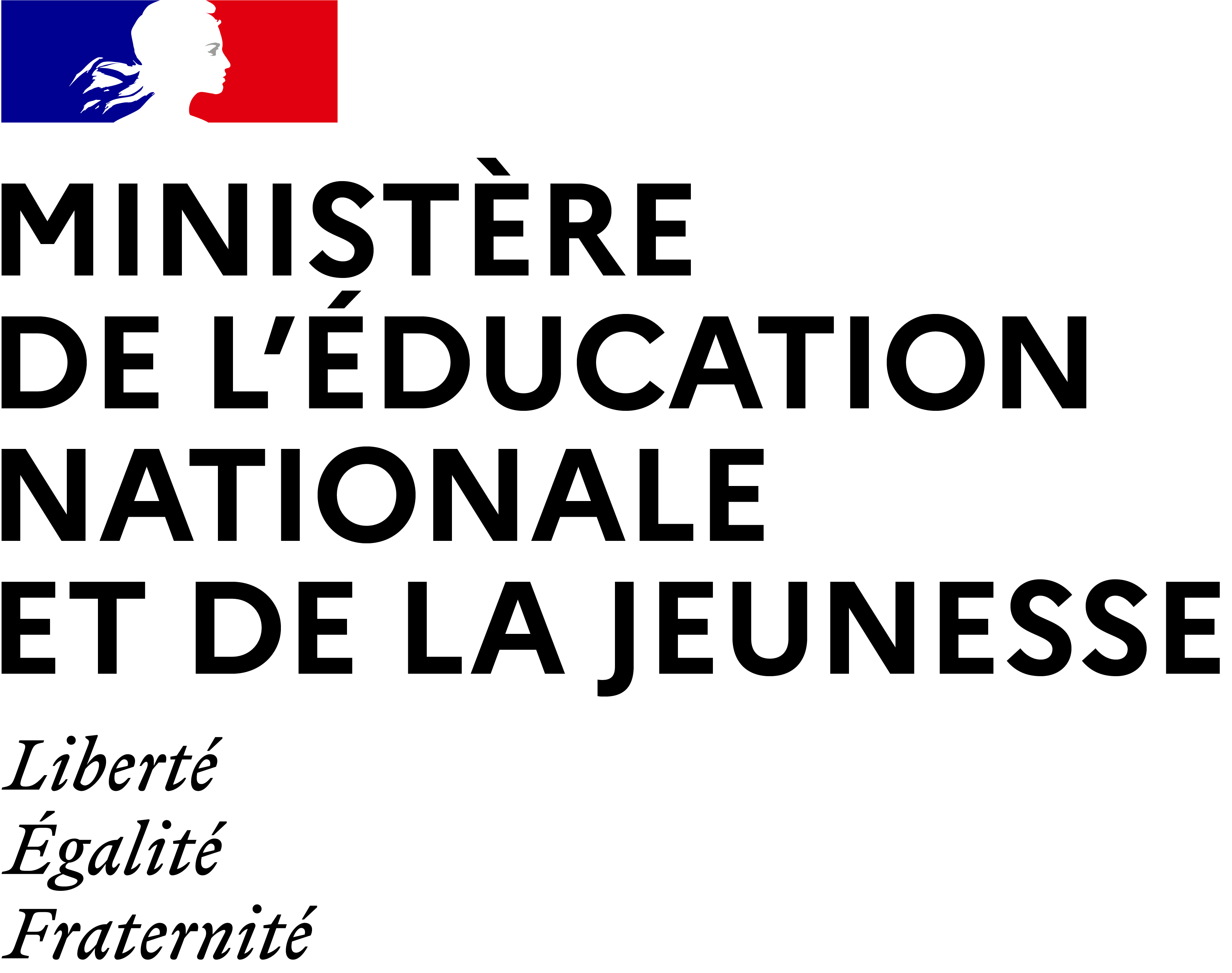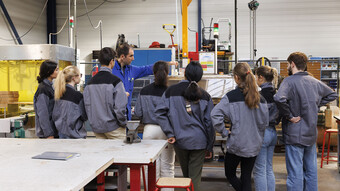[ARCHIVE] Stronger vocational pathway
The new vocational secondary school aims to respond to the new demand for skills, specifically in terms of ecological and digital transition, and to reinforce the appeal of vocational education. In addition, a new generation of Campuses offering vocational activities and qualifications will guarantee vocational excellence in every region of the country.
Partager
The start of the 2019 school year is the first one for the new upper secondary vocational school.
This change in the upper secondary vocational school stems from consultations engaged over the last two years. This work goes hand-in-hand with the law For the freedom to choose one's professional future passed in August 2018.
The new upper secondary vocational school aims to meet the new needs for skills linked mainly to the ecological and digital transitions and to boost the appeal of vocational teaching, by offering more gradual guidance and personalised pathways, and to support pupils better through new teaching arrangements.
A new generation of Campus des métiers et des qualifications (Trade and qualification campus) offers the professional excellence of our country throughout the territory.
A new ambition : the Campus of Excellence
The Campus of excellence, developed in each region, aim to create a network of quality vocational training courses throughout the country. Prepared closely with the regions and professionals, they unit businesses and players in training and research. Genuine living centres that showcase the excellence of a business sector, they participate in the appeal of vocational training.
A call for projects has been launched in 2019. Eight endorsement files were submitted as at 20 August 2019. They will continue to be processed until the Autumn.
This call for projects is granted €50 million under the Programme d'Investissements d'Avenir (PIA - Investments for the Future programme).
A new grade 10 and a new cap
Pupils are not always entirely clear about the profession they wish to follow when starting at upper secondary vocational school. It has therefore been decided to arrange Grade 10 by families of profession so that :
- pupils can explore all careers in a same professional field
- they have time to choose the profession that suits them best.
At the start of the 2019 school year, three initial families of profession have been introduced in the vocational Grade 10 :
- sustainable construction, building and public works
- customer relations and administrative management professions
- transport and logistics professions.
Starting this year, the upper secondary vocational school reforms are increasing the number of classes of half the normal size so that pupils can benefit from improved monitoring.
Grade 10 pupils will therefore have certain jointly-taught classes. This combination of a general teacher and a specialist teacher will thus make the general teaching more solid and the meaning of both the general and vocational teaching far clearer.
The new CAP has been introduced this year. It offers more flexible pathways as it can be taken over one, two or three years.
In addition, upper secondary school pupils benefit from updated general teaching programmes. They come into force in first year CAP and in vocational Grade 10 this year.
Division of the timetable in upper secondary vocational school (grade 10, 11 and 12)
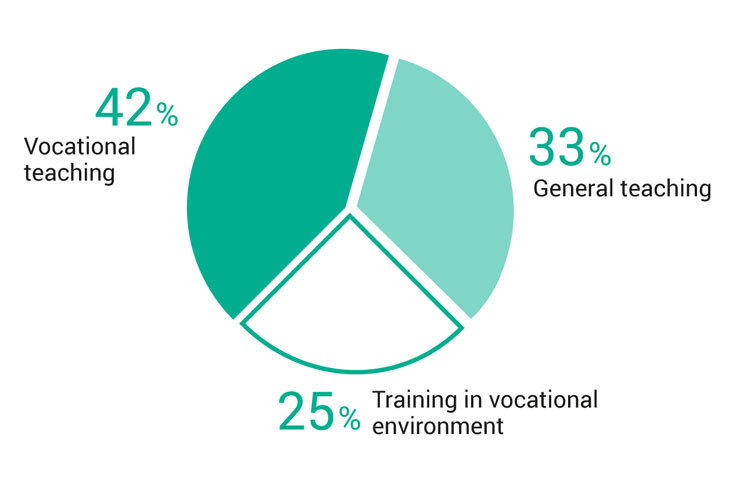
More gradual pathways and improved support
Starting this year, Grade 10 pupils can benefit from the extra support resulting from the transformation of the upper secondary vocational school.
The plan is to allocate specific time to support (265 hours over three years): consolidation hours in French and maths, one-to-one support and support in choosing which course to follow.
The pupils will thus be informed better about the diverse pathways on offer between actual school and apprenticeship.
Mobility is an essential aspect of solid vocational training. Experiments with the mobility option in the vocational baccalauréat since 2014 (7,000 candidates in 2018) have been consolidated and extended to other secondary vocational diplomas. In addition, under "long" mobilities (more than two months), it is now possible to enhance skills acquired abroad.
Pathway of pupil commencing a vocational baccalauréat in 2019
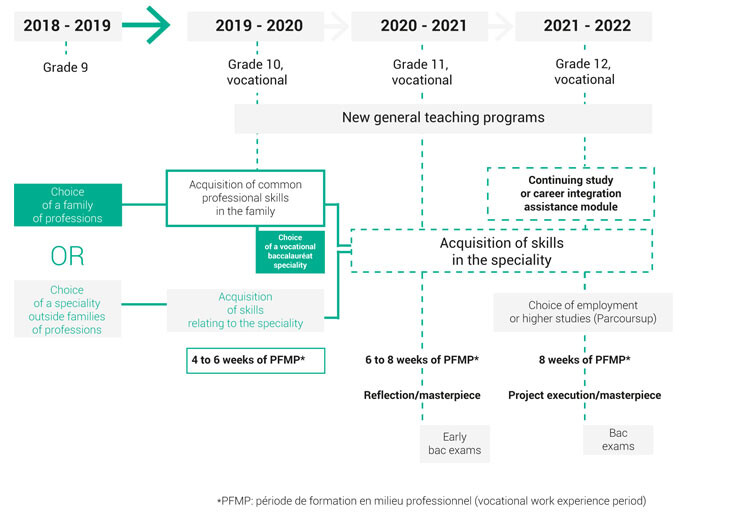
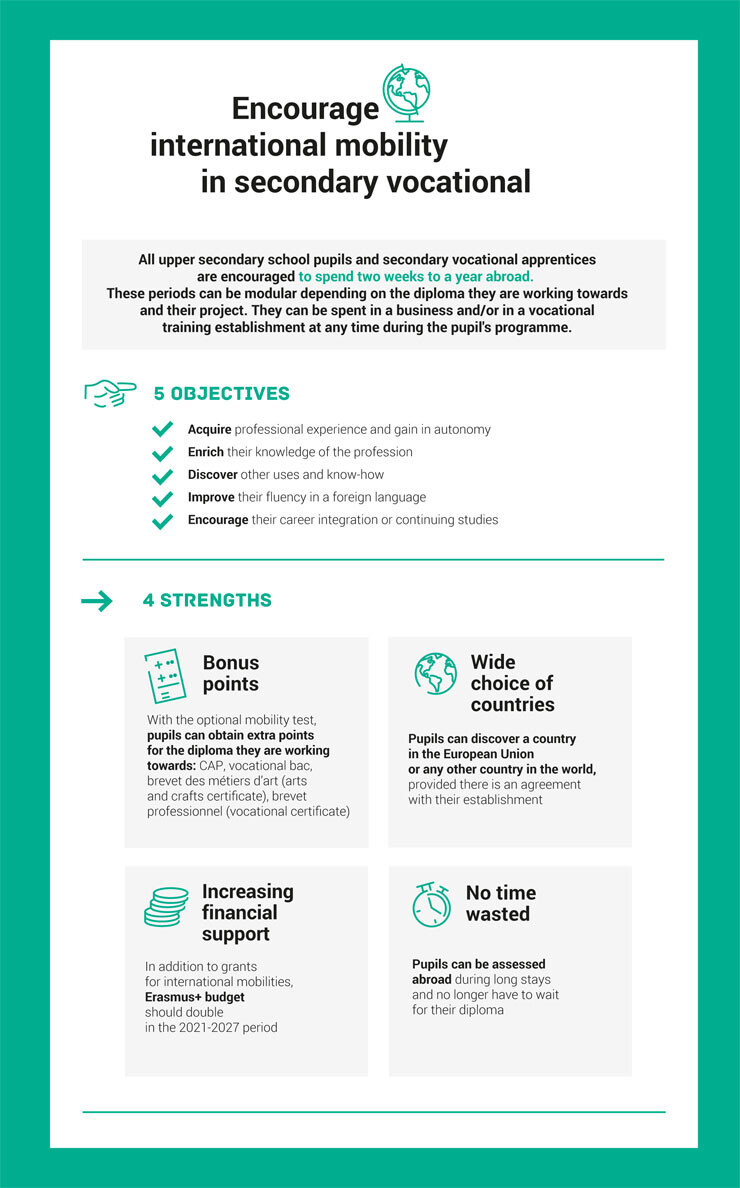
More key policies
Together for a School of Trust
Pre-primary school at three years old for all
Grade 1 and Grade 2 classes with twelve pupils : 300,000 children involved
Grade 1 and Grade 2 assessments to anticipate learning difficulties
Annual benchmarks in primary and lower secondary school to guide pupil progress better
Consolidate primary school in all regions
Support the most vulnerable families
Provide better facilities for disabled pupils
Homework done : work towards success of all pupils
Culture and arts at the heart of the school system
Mobilisation for Paris 2024 : boost sport at School
Guide pupils better and lead them to success
Stronger vocational pathway
Upper secondary general or technological school : new Grade 10 and Grade 11 classes
New dynamics for living languages through all school levels
Digital learning aids
A School at the forefront of ecological transition
The principle of secularism at the heart of School and the society of trust
The School of respect for others
Develop the culture of engagement : the UN system and the civic service
Boost initial teacher training
Support personnel throughout their career
Improve labour conditions for staff
Involve families better in School life
Wednesday plan and education cities : enhance out-of-school times
An ambitious boarding school policy serving pupils and territories
100 % success in primary school : strengthening French and mathematics instruction
Opening French schools to Europe and the world
Banning the use of cellphones in primary and lower secondary schools
Supporting books and reading
Enriching the lower secondary school curriculum
Promoting a culture of innovation
Mise à jour : septembre 2022
